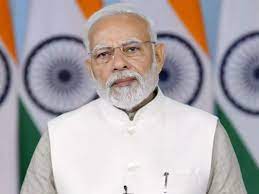As India demonstrates its potential, millennials have a world of opportunities
On Friday, Prime Minister Narendra Modi said that owing to its shown ability, India currently enjoyed more respect and adoration throughout the globe, and that this was creating a wealth of chances for Indian young and students in both the humanities and technology.
He was speaking at the University of Delhi’s Centenary Celebrations Valedictory Ceremony, which was being attended by a large contingent of senior academics, students, and alumni, at the Multipurpose Hall of the Delhi University Sports Complex.
The Prime Minister said that his recent visit to the United States demonstrated that the world now respected Indian youth and had noticed Indian ability. One of its results was the conclusion of the Initiative on Critical and Emerging Technology (iCET) agreement between India and the US.
He said that this will provide the young of India with many options, from the earth to space and from semiconductors to artificial intelligence (AI).
He said that young people in India will have access to technologies that had previously been out of reach and that they would also develop their talents. US businesses like Micron, Google, and Applied Materials have chosen to invest heavily in the nation. All of this spoke to the direction India was going and the chances that would be accessible to Indian youngsters.
India is being approached by the Industry 4.0 revolution, the prime minister said. AI, AR, and VR were previously exclusively seen in science fiction films in India. These are now a part of everyday life. Robotics have taken over a variety of industries, from driving to surgery, and he said that these fields are providing new opportunities for young people and students.
India has expanded its military industry and unveiled new drone policy guidelines. He said that as a result of these choices, most young people will have opportunity to advance in their jobs.
The Prime Minister demonstrated how, beyond technology, India’s expanding worldwide influence was creating new opportunities for work in the humanities. He said that people are becoming more curious and interested in Indian culture as a result of India’s rapid growth. During the Corona crisis, when the majority of nations were concerned about their basic needs, India was providing assistance to other nations.
He said that the world started to wonder about Indians’ morality and their propensity to think about assisting people in need. People are curious about India because of its expanding capability and its G20 Presidency. According to him, this is opening up chances for Indian humanities students to do study on their culture and spread awareness of it worldwide.
According to Mr. Modi, topics such as yoga science, culture, festivals, literature, history, heritage, systems, and food are all now being discussed. They draw interest and are in high demand. Thus, he added, there is a growing need for young people who can showcase India’s diverse capabilities to the outside world.
Indian ideals like democracy, equality, and respect for others are setting the bar for human values for the rest of the globe and giving Indian youngsters new chances in fields like diplomacy and administration. He said that disciplines of history, culture, and tradition exhibit limitless new possibilities.
According to the Prime Minister, tribal museums are being established in several states throughout the nation, and the PM Museum is showcasing the history of independent India. Yuge Yugeen Bharat, the biggest historical museum in the world, would be established in Delhi, he said. Students studying art, culture, and history now have the chance to transform their hobbies into careers for the first time, he said.
The recognition of Indian instructors is also rising, he said. According to Mr. Modi, foreign leaders had often informed him about their Indian tutors. “This soft power of India can be a success story for the Indian youth,” he said. The educational institutions and universities in India must develop a mentality and a plan for doing this.
According to the prime minister, educational institutions must educate students psychologically to accomplish their national goals in the same way that individuals do to achieve their own. According to Mr. Modi, only the goals and purposes of these organisations can help India’s young people become “future ready” and equipped to handle problems.
The country is commemorating the Azadi Ka Amrit Mahotsav after 75 years of independence, and the prime minister said that Delhi University has reached its centennial.
According to him, educational institutions like universities represent the accomplishments of any country. The bigger the nation’s splendour, the deeper the roots of its educational institutions.
Therefore, Mr. Modi said, there is a need for a link between the aspirations of countries and colleges. In its 100-year history, the Delhi University, according to him, has established several milestones and impacted the lives of many students, faculty, and other people.
On this occasion, the Prime Minister formally placed the cornerstone for the construction of the Academic Block, Computer Centre, and Faculty of Technology on the university’s North Campus. He published three books: Aura – 100 Years of University of Delhi, a Logo Book, and a Commemorative Centenary Volume – Compilation of Centenary Celebrations.







